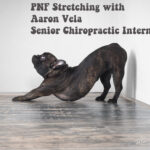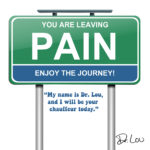Shoulder pain in guitarists. Bass Player shoulder pain.
Why do so many guitarists have shoulder issues? It’s really quite simple. One arm is up to work the neck and frets of the guitar, the other arm is down to strum.The strap of the guitar pulls down on the shoulder of the hand on the neck of the guitar, applying pressure to the trapezius and elevator scapula muscles, among others. Looking down at music, or the guitar itself puts additional strain on the neck and upper trapezius muscles. This strain makes the head feel heavier, but it’s the muscles of the upper traps, upper back, shoulder and neck muscles that do most of the work to provide your neck with the angle to look down. This combination, in conjunction with stress of life, is plenty to cause chronic neck and shoulder pain and fatigue. I am often asked, when is it too late? When has the problem become “unfixable?” Fortunately, until the spine or shoulder joint itself is involved in the way of degeneration (arthritis), disc disease, or reversal of the curve of the neck, most discomfort is muscular in origin. These muscles run down into the shoulders and will make everything hurt, but the bark is often bigger than...
read moreTennis Elbow Pain. Best Home Exercises!
How to Reduce Pain from Tennis Elbow – At Home! Generally speaking, Tennis Elbow (aka Lateral Epicondylitis) is an overuse injury that can cause small tears in the muscle tendons that attach to the outside of the elbow, resulting in pain, dysfunction, and the annoying inability to perform once easy daily tasks. A new systematic review and meta-analysis in the Journal of Clinical Medicine by Yoon et al. published in September 2021 determined that there are key exercises that can reduce your elbow pain significantly and conservatively and those are “Eccentric Exercises” of the forearm.¹ Eccentric muscle contraction occurs when you load the muscle while lengthening it, while concentric muscle contraction occurs when you load the muscle while shortening it. Here is a video showing how to perform eccentric exercises for the forearm to help reduce your elbow pain over time. You can use a resistance band, a dumb-bell, a rubber resistance bar, or even a filled water bottle. Frequency can range between 10-15 repetitions per set, 2 times per day, 3 days per week, using 1-5 pounds to start. You can decrease or increase these parameters depending on your ability. Here in the office, incorporating adjustments, acupuncture, physiotherapy...
read moreBetter Stretching with PNF! Hamstring Miracles Happen!
PNF Stretching: A Better Way to Stretch What is PNF? PNF stands for Proprioceptive Neuromuscular Facilitation and it’s an advanced form of stretching that is very effective for increasing your range of motion. How does it work? The stretching essentially involves 3 basic steps that can be applied to any muscle that needs stretching, especially before and after a physically demanding activity. The stretching utilizes reflexes in the muscles, as well as excitatory and inhibitory signals in the muscle being stretched, and the muscle opposing the stretch. You can think of it as stretching the involved muscle, then contracting the muscle without moving it, then stretching the target muscle again, increasing your range of motion. The technique has long been used by athletes across the world for improving flexibility quickly, safely, and very effectively. How do I do it? It’s easy. This stretching technique can be applied to any muscle! Just apply these steps. Step 1: Stretch the muscle as you normally would for about 6-10 seconds. Step 2: Relax the stretch, but now concentrically contract the muscle for about 6 seconds (flex the muscle without bending the joint). Step 3: Relax the contraction, but now re-stretch the muscle...
read moreChronic Pain: 5 Ways back pain Gets Worse.
5 consequences of untreated chronic pain in your back. Chronic Low back pain affects tens of millions of Americans every year. Chronic pain ruins work, vacations, family time, sleep, even marriages. Medications are expensive, often have bad side effects, and sometimes need to be taken forever. Drug addiction, depression, anxiety, as well as reduced quality of life, are all associated with chronic back pain. “Chronic” back pain is often considered to have been present for more than 12 weeks. Acute back pain is new pain. Acute pain, left to resolve itself, often becomes chronic pain. #nobueno Further Injury. Chronic Pain in our back leads to changes elsewhere in the body. Most people call this “compensation.” Our bodies are intelligent and they adapt and change to try to make you more comfortable, to keep things stable, and adapt for the best function and movement possible. As you can imagine, those changes lead to more changes. Think of it as a pebble rolling down a mountain that picks up other stones as it descends and can lead to an avalanche. Structural compensation due to back pain always involves changes in joint function and position. Long term changes joints and movement lead to...
read moreRestaurant Worker Stress. Causes and simple solutions.
The stress of the restaurant and Kitchen. Easy action steps for healing. Mental stress changes the chemistry of your body, and tightens your body’s tone. The kitchen is one of more mentally stressful work environments. You don’t need examples if you work in one. What is needed, is an understanding of why you feel the way you do and what you can do about it. Mental stress causes body chemistry changes like adding vinegar to baking soda. Inflammation and adrenaline are let loose throughout the body. KABOOM. If you are working under stressful conditions all week, your stress level doesn’t go down. Sustained mental stress puts fatigue on the adrenal glands, leading to a condition you’ve probably heard of….adrenal fatigue. You burn out, feel tired, sluggish, have difficulty sleeping, which cycles back around and creates a vicious cycle of more stress, more fatigue that causes more stress, and so on. Physically, your body tightens up from mental stress. Neck, shoulders and low back slowly seize. And that’s just from mental stress. The physical stress of standing, cooking, leaning, shuffling and the like, all make matters worse. Getting a bad night’s sleep also makes matters worse. The stress of the...
read more




